Commonwealth Games and fantasy coalitions .. what is “the Commonwealth” today anyway?
Oct 7th, 2010 | By Counterweights Editors | Category: In Brief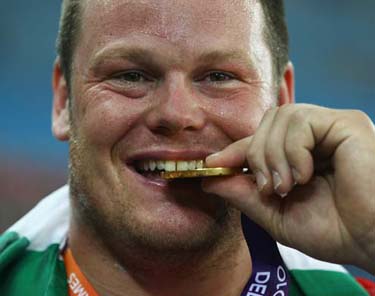
Dylan Armstrong of Kamloops, BC, celebrates his gold medal win for Canada in men's shot put final at XIX Commonwealth Games in New Delhi, October, 7 2010.
Toward the end of the first full week of October 2010 (or 10/10: and apparently marriages at the local city hall for this coming Sunday 10/10/10 are way over-booked), Canada seems to be doing somewhat better in the Commonwealth Games.
As we write (“Friday, October 08, 2010″ in New Delhi, but still just Thursday, October 07, 3 PM ET, 12 NOON PT here in North America), our Canadian team has 11 gold, 2 silver, and 11 bronze medals. This apparently puts us at fourth place in the official rankings, behind Australia (32 gold, 19 silver, and 18 bronze), India, and England.
This is considerably better than as recently as yesterday. But it is still no match for Australia (which has slightly less than two-thirds of our population: 22.5 to 34.1 million). And this leaves us wide open to the argument that mere technical performance is not the most important feature of the ostensibly athletic gathering in New Delhi.
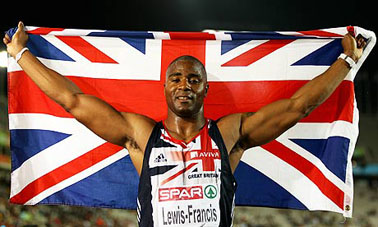
Great Britain's Mark Lewis-Francis celebrates his silver medal in the 100m at the European Championships in Barcelona, earlier this year. Photograph: Ian Walton/Getty Images.
So perhaps the best news about the Games is that, after an understandable enough shaky start – and remember our recent Vancouver Winter Olympics had some unsteady early moments of its own – India is proving a good and benign host. (Even if there are still a few such headlines as: “Condom-clogged drains a good sign: Commonwealth Games head.”)Â According to British track and field star, Mark Lewis-Francis: “India is putting on a great show, man. I am enjoying my moment here.”
Meanwhile, back in Canadian federal politics, the most interesting recent news comes from the launch of “a new book by retired La Presse reporter Gilles Toupin on” Bloc Quebecois leader Gilles Duceppe’s “reflections about politics and Quebec sovereignty.”
The particular point for the current Ottawa scene involves only a few pages of the Toupin tome, on the late 2008 reality behind PM Harper’s current 2010 “coalition fantasy” about the wicked Liberals, New Democrats, and Bloc Quebecois.
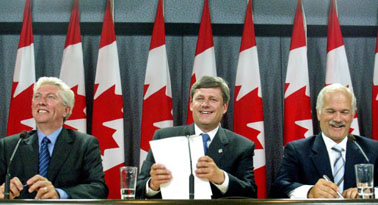
The very first coalition: Bloc Quebecois Leader Gilles Duceppe, Conservative Leader Stephen Harper and New Democratic Party Leader Jack Layton share a laugh during a news conference in Ottawa, September 9, 2004. Photo: Reuters.
For two intriguingly different views on this subject see “Hébert: Duceppe hands Harper fresh anti-coalition ammunition” in the Toronto Star, and “Duceppe says he’s talked coalition with all parties at some point” in the Vancouver Sun.
And now, for something completely different again, all this, in some no doubt strange enough way, also makes at least us wonder why there seems so little talk in Ottawa these days about the Commonwealth Games, or, for that matter, the Commonwealth writ large?
* * * *
One obvious enough answer is just that federal politicians already know “the Commonwealth” generally is not something large numbers of the Canadian people care all that much about in the early 21st century.
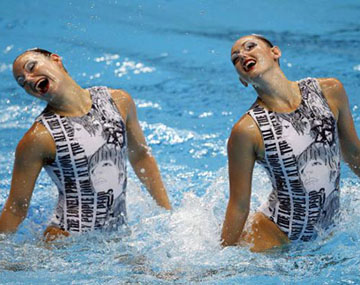
Eloise Amberger and Sarah Bombell of Australia perform in the women's synchronized swimming duet technical routine, October 6, 2010. Photo by: Reuters.
Two recent (and comparatively recent) polls offer guidance on this front.
Just last month, eg, when the adequacy of India’s preparations for the Commonwealth Games was being called into question by many mainstream media organizations outside India, the Globe and Mail asked its readers: “Should Canada participate in the Commonwealth Games in New Delhi?” Only 37% (5317 votes) answered Yes, and 63% (8984 votes) No.
And then, last summer (ie in 2009) the Royal Commonwealth Society asked a representative sample of Canadians: “Which one of the following is the MOST important to Canada?” Almost two-thirds (63%) said “America.” Only 15% said “The Commonwealth.” Another 8% said “Europe,” and 14% said “Don’t know.”
* * * *
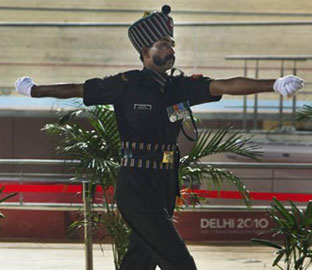
A member of the Indian Army – sporting a moustache still somewhat redolent of the old Raj? – on guard at the XIX Commonwealth Games 2010.
In a now rather archaic (but still historically interesting) old textbook, first published in 1947, the University of Toronto political scientist Alexander Brady wrote: “Canada is in North America. It is also in the British Commonwealth. The profound and interacting implications of both facts explain the nature of Canadian nationality.”
In the Royal Commonwealth Society survey of 2009, the 63% on the North American side of this equation – and only 15% on the side of what is now just known as “the Commonwealth” – suggests at least one of several ways in which “the nature of Canadian nationality,” such as it is, has changed over the past 62 years.
(And Australia, eg, has not had quite the same kind of political-cultural evolution, even though it too has changed quite dramatically in other similar respects. It does not, eg, live right next door to the United States – or, for that matter, have a quarter of its population still speaking French. And it does not belong to La francophonie too, etc.)
At the same time, one of the rather implausible but quite apparent objectives of Stephen Harper’s Conservative minority government in Ottawa has been to somehow revive something of the spirit behind Alexander Brady’s declaration of 1947 (which he did not see fit to remove from either the 1952 or 1958 second and third editions of his textbook – although there was no fourth edition, for good enough reasons).
This aspect of PM Harper’s aspiring Canadian cultural development policy has already been complained about on this website: see, eg, “The strange new Canadian citizenship guide: forcing the 19th century relic of the ‘constitutional monarchy’ down our throats” [Nov 14th, 2009].
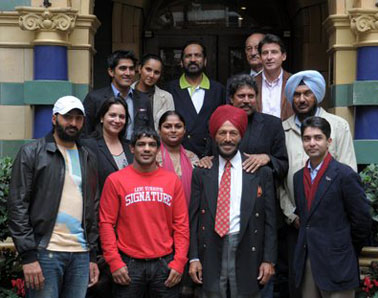
The Commonwealth Games Federation (CGF) President, Mr. Mike Fennell, the Chairman of Organising Committee, Commonwealth Games 2010 Delhi, Shri Suresh Kalmadi, and the Chairman of London Olympics 2012, Lord Sebastian Coe, with the Baton bearers of the Commonwealth Games Delhi 2010, in London on October 28, 2009.
A curious observer of the current Ottawa scene might nonetheless reasonably wonder why the Harper minority government has not logically accompanied its interest in reviving something of the old British North America (remember how we used to call the current Constitution Act 1867 the British North America Act?) with a parallel renewed interest in the Commonwealth Games? An event of this sort, at least, could have some potential for actually interesting large numbers of the practically sovereign Canadian people, who are not usually too concerned about (or convinced by) the finer points of the British “constitutional monarchy” in Canada?
* * * *
Here, it would seem, the crucial problem is that the Commonwealth of Nations in 2010 is just (or increasingly, at any rate) not at all like the British Commonwealth of 1947, that Mr Harper and his longtime friend and colleague Jason Kenney (and even the current editors of the Toronto Globe and Mail, apparently) for some reason want to somehow return to, in part if not ridiculously altogether, etc, etc, etc.
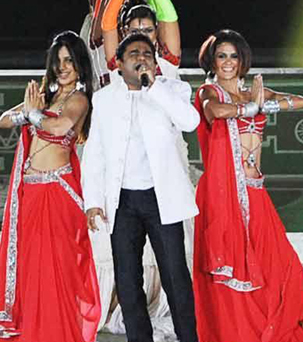
Oscar-winning composer AR Rahman sings at the opening ceremony of the XIX Commonwealth Games at the Jawaharlal Nehru stadium in New Delhi.
And this point is being underlined quite nicely by the Commonwealth Games of 2010, in New Delhi, India.
Many continuing fans of the current very vague symbolic presence of the British monarchy in Canada today still identify the institution with what is still often perceived as Canada’s parallel membership in the Commonwealth.
Yet while Queen Elizabeth II remains the symbolic “Head of the Commonwealth,” among the 54 current Commonwealth members (including the still suspended Fiji) only the United Kingdom and 15 other so-called “Commonwealth realms” still legally and constitutionally regard the Queen as their symbolic head of state domestically. The majority of Commonwealth members today are one form or another of republic.
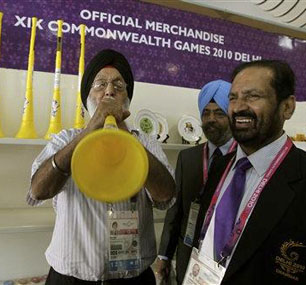
Vuvuzelas, the plastic horns made famous at the World Cup in South Africa, are also on sale at Commonwealth Games in New Delhi, 2010.
Similarly, as a Chinese report of a year or so ago nicely explained, the Commonwealth today “represents around 2 billion people, although more than a billion are in just one member, India.”
Logically enough, the current Commonwealth Secretary General “is Indian-born, Kamalesh Sharma, who took office in April 2008.” The current director of the Royal Commonwealth Society – “an international educational charity based at the Commonwealth Club in the heart of London” – is Danny Sriskandarajah. His Communications Assistant is Anushya Devendra. And Meera Chindooroy is Youth Programmes Assistant.
It would still seem somewhat premature to say that the Commonwealth today is increasingly under Indian – as opposed to old-school UK or British – leadership. But perhaps especially at the Commonwealth Games in New Delhi right now, it does appear possible to detect certain beginnings of a potential 21st century Commonwealth led to no small extent by its by far most populous modern parliamentary democratic republic of India.
And an Indian-led Commonwealth might be quite a useful thing – for Canada and much of the rest of the world too. It probably is regrettable that we aren’t paying more attention to the current Commonwealth Games, in the most northern parts of North America. Unlike Mr. Harper’s essentially medieval enthusiasm for the old British constitutional monarchy (and don’t tell us it is really Canadian : that is a form of Orwellian doublespeak, at the very least), supporting and engaging with India’s rising new Commonwealth might actually do the aboriginal, bilingual, and increasingly culturally diverse new Canadian people some good – while still paying an updated homage to the Empress of India’s old global village “on which the sun never dared to set.”
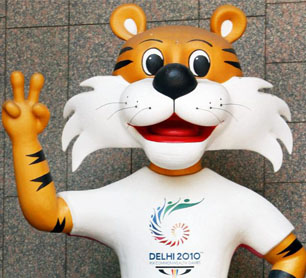


We at the Royal Commonwealth Society were very interested to read Counterweights’ piece of 7 October 2010 entitled ‘Commonwealth Games and fantasy coalitions…what is the Commonwealth today anyway?’ We were particularly pleased to see the incorporation of our opinion polling on the Commonwealth from the Commonwealth Conversation, a project the RCS ran earlier this year which constituted the largest public consultation ever conducted on the Commonwealth.
However, as flattered as I undoubtedly am to be implied as being part of the Commonwealth’s ‘Indian leadership’, I feel obliged to inform you that I am, in fact, of Sri Lankan descent. The Royal Commonwealth Society’s Director, Dr. Danny Sriskandarajah, is also of Sri Lankan origin. Our colleague Meera Chindooroy has family roots in India, but is of Burmese, Malaysian and Sri Lankan descent.
Kind Regards, Anushya
Many thanks for the corrections, Anushya. And a thousand apologies. We should perhaps have referred to potential “South Asian leadership,” or some such broader category. Best wishes.